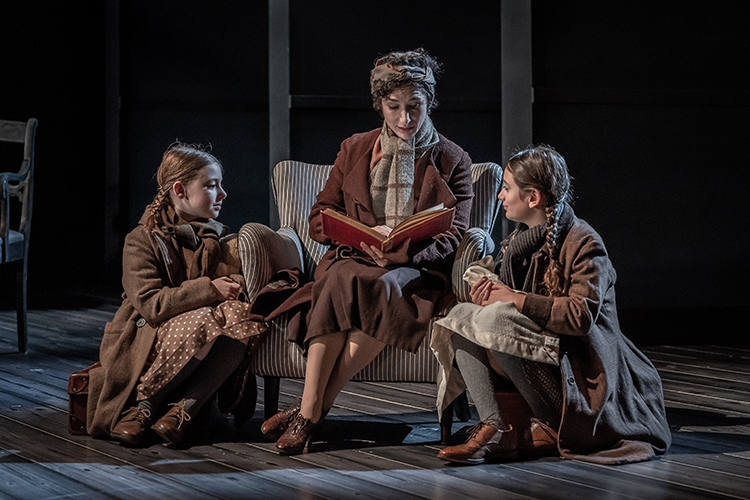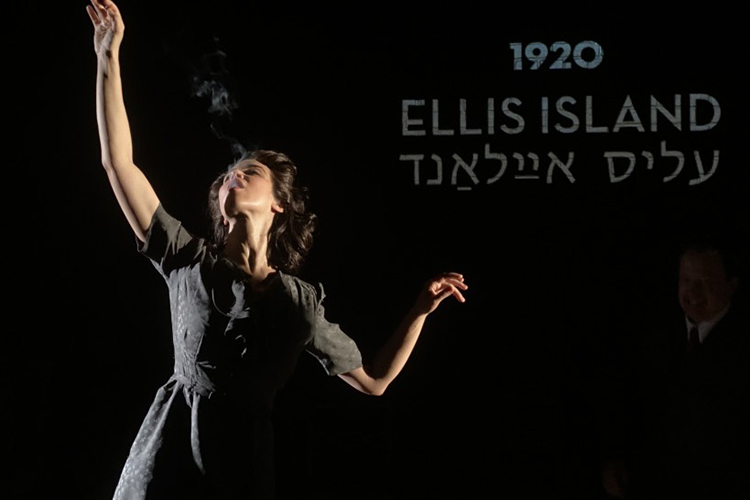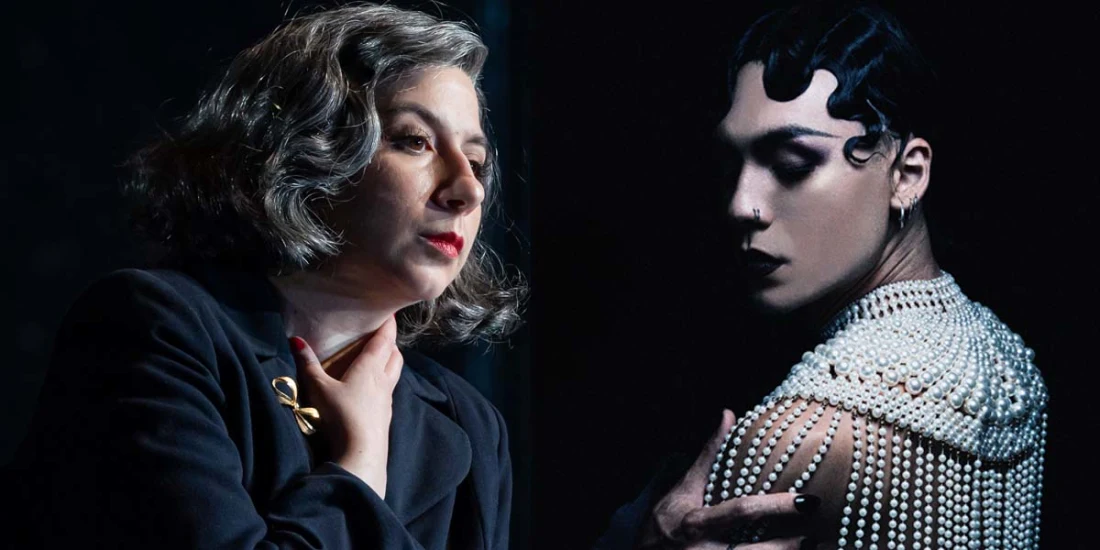Jewish stories onstage: London theatres explore Jewish history through different lenses
Here's one interesting feature of the London theatre as autumn hoves into view: for whatever reason, the capital's stages are unusually alive to Jewish stories just now. These shows, it should be emphasised, are markedly different one from the next. No one would confuse Tom Stoppard's revelatory theatrical realisation of his own Judaism in Leopoldstadt, which has been recognised as perhaps the last play from an 84-year-old legend (let us hope it isn't), with the entirely separate historical trawl of Indecent, a historical enquiry of its own. The Pulitzer prize-winning playwright Paula Vogel has filtered her own feelings of marginalisation into recounting a troubling episode from New York's theatrical history a century ago.
But to find these plays aligned in a season that has also found room for Once Upon a Time in Nazi Occupied Tunisia, Camp Siegfried, and an eagerly awaited new revival of that perennial classic Cabaret is to be reminded of the breadth of storytelling, and of its power. What follows is a quasi-synoptic rundown of these titles, intended not as reviews, which can be sought elsewhere, but as a way of bringing attention to a convergence of themes that with luck then enable art to take over and do its transformative work.

Leopoldstadt
Sir Tom Stoppard's Olivier Award-winning play was shut down by the pandemic only to resurface at the Wyndham's Theatre to continue its acclaimed engagement, despite boasting the sort of Covid-wary cast in numbers that you might expect in a musical. In this instance, it's impossible to separate Stoppard's mournful dynastic-era survey of his own Jewish origins from the contribution of his director Patrick Marber, who is of course himself a playwright as well.
There have been some cast changes since the debut of a play that no longer features Adrian Scarborough as the Jewish paterfamilias, Hermann, who is married to a Catholic and whose character stands out above the plenitude of personages that Stoppard accommodates in a drama cantering through time to close with a reckoning with the ravages of the past in 1955. Widely recognised as more accessible than is this writer's wont, Leopoldstadt gives the impression of not wanting authorial tricksiness to get in the way of a story its author has decided must finally be told.

Once Upon a Time in Nazi Occupied Tunisia
Josh Azouz's previous play, The Mikvah Project, was among the recently opened shows that were gathering attention in March 2020, when its Orange Tree Theatre premiere was itself shut down by the pandemic. So it seems only fair that the London-based Jewish writer-director should have been quick out of the starting gate at the moment with an Almeida premiere whose title pays obvious homage to Quentin Tarantino, as does the tonal variation contained within the writing itself.
Opinion is sure to be divided as to how well a play set in the unusual setting of North Africa in the early 1940s manages to blend comedy and horror, an amalgam embodied most directly by Adrian Edmondson as the tellingly named Grandma, who is meant to make us shiver the more he smiles. Azouz and his director, Eleanor Rhode, put their geographical terrain at the service of a play whose portrait of Jewish-Muslim allegiance (or lack thereof) is clearly meant to resonate with society just now. So, too, are references to rallies and the like that call to mind not only a country under invasion by the Nazis in 1942 but contemporary America and elsewhere: for all its deliberate facetiousness, the topicality of the play is no laughing matter.

Indecent
The American writer Paula Vogel's play won two 2017 Tony Awards following its Broadway transfer from the Vineyard Theatre, including one for the director Rebecca Taichman, who is in charge of this European premiere at the Menier Chocolate Factory as well. Not far away from opening when the pandemic struck, the play is back on its feet with a galvanic cast that includes musicals veterans Cory English and Alexandra Silber, alongside the charismatic Joseph Timms, who was a knockout in John Webster's The White Devil at the Sam Wanamaker Playhouse early in 2017.
And in contrast with the other titles here mentioned, Indecent concerns itself less overtly with the rise of the Third Reich or the Holocaust but with a defining Jewish text, Sholem Asch's God of Vengeance, and those artists fearless enough to engage with the Yiddish play's same-sex subject matter in 1922 New York: even textual revisions at the time weren't enough to keep its performers out of prison. Mores may to some degree have changed or maybe they've just found a newly censorious home via the internet.

Camp Siegfried
Bess Wohl has been a busy presence on and off Broadway of late, between such titles as Grand Horizons. Make Believe, and Small Mouth Sounds. London's comparative unfamiliarity with her work will change with the world premiere at the Old Vic of a two-hander, directed by Katy Rudd, whose online trailer is enough to exert a palpable if tension-inducing intrigue.
Inspired by the goings-on at an actual summer camp of the same name that was situated in Long Island, New York, in the 1930s, the play takes a look at American youngsters of German descent as war is brewing an ocean away. That the two characters are billed only as Him and Her suggests something iconic, or at least paradigmatic, about roles which have landed in the expert hands of Leopoldstadt alumnus Luke Thallon and 2019 Olivier Award-winner Patsy Ferran (Summer and Smoke). As for what else is in store for the press on 17 September? We'll simply have to wait and see.

Cabaret
This 1966 Broadway musical with music and lyrics by John Kander and Fred Ebb and a book by Joe Masteroff has been associated both sides of the Atlantic with the director Sam Mendes's era-defining production, which began at the Donmar in 1993 before storming Broadway for two separate extended runs.
Now comes Rebecca Frecknall, the fast-rising talent behind such productions as the Ferran-led Summer and Smoke, to reveal this time-honoured title anew, abetted presumably by Eddie Redmayne back onstage after way too long an absence as the Emcee and the equally protean Jessie Buckley as "Fraulein Sally Bowles" - the English cabaret performer and Kit Kat Club headliner who transfixes a Berlin public even as the society around her prepares for a self-immolation watched over by the all-knowing Emcee. To mark the occasion, the Playhouse Theatre is being transformed into a club for an end-of-year production that, by rights, should send the London theatre hurtling into 2022.
Photo credit: Jenna Augen in Leopoldstadt and Cabaret artwork (Photos by Marc Brenner and Joel Palmer)
Originally published on
